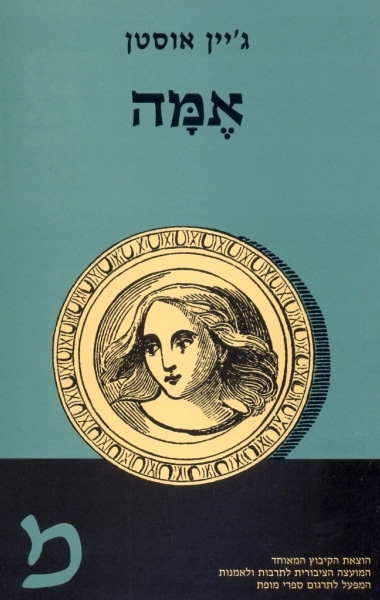גם בקריאה שניה, במהדורה בעברית, מצאתי את אמה כאחת הדמויות המעצבנות ביותר שיצרה ג'יין אוסטן.
קראתי כמעט את כל ספריה של ג'יין אוסטן, אני חושבת שאולי לא קראתי רק ספר אחד. בכל הספרים, הדמות הנשית המרכזית, היא בת למשפחה מהמעמד התחתון ומתלווה למשפחות מבוססות מהמעמד הגבוה והעשיר.
ככזו, הדמות ענווה, ונושאת תכונות אופי ראויות להתהדר בהן של שיקול דעת, צניעות ותרבות. הדמות הזו בדר"כ מסייעת לשקף את תחלואי החברה הגבוהה במאה ה -19 והיא מראה אירונית לחברה ולמנהגיה.
לא כך באמה.
אמה וודהאוס, היא בת למשפחת עשירים. היא אינה מעוניינת להינשא או להקים משפחה והיא אינה סובלת ממצוקות כלכליות, שכנראה מחנכות לצניעות, ענווה ורגישות חברתית. לכן גם נותר בידה זמן לבצע את "הניסיונות החברתיים" שלה בבני אדם, ולהסיק מהם גם מסקנות כושלות ושגויות. היא סנובית, חסרת מודעות עצמית וככזו היא גם שופטת מטעם עצמה את הזיווגים הראויים (וגם את אלה שלא).
כשהיא אינה עסוקה באביה ההיפוכונדר, היא משתעשעת בהפעלת מניפולציות רגשיות על מכריה, שכולם באופן מדהים מטים לה אוזן. למעט מר נייטלי, בעל האחוזה הצמודה שמתרה בה ומעביר על התנהגותה ביקורת.
היא מתיימרת להבין בנפש האדם, במיוחד היא מבינה את רחשי הלב והרגש של קרוביה ומכריה ובכך מביאה עליה ועליהם את מפלתם.
מרבית הספר עוסק בחיי היום יום של אמה, שמעבר לזיווגים שהיא חושבת שהיא מזווגת, גם עסוק בפטפטת ורכילות בלתי נלאית וחסרת כל תועלת.
כפי שכתבתי בעבר הספר אינו מגיע לרמתו של "גאווה ודעה קדומה". דמותה של אמה, אורכו והתמקדותו ברכילות ובחיי הכפר פשוט מבטלים כל סיכוי שיהיה בו את העיניין שהיה בגאווה ודעה קדומה.
אמה / ג'יין אוסטן
הקיבוץ המאוחד, 1982, 333 עמ'
דירוג SIVI –
איכות אודיו –

Upon my second reading of the Hebrew edition, I found Emma one of Jane Austen's most exasperating characters.
I have read almost all of Jane Austen's books, but I believe I may have missed just one. In each book, the main female character comes from a lower-class family and interacts with well-to-do families from the upper class.
The characters are humble and possess admirable traits such as discretion, modesty, and culture. This character is often used to highlight the negative aspects of high society in the 19th century and serves as an ironic reflection of society and its customs.
Not so with Emma.
Emma Woodhouse comes from a wealthy family and has no interest in marriage or starting a family. Since she doesn't have to worry about financial difficulties, she has time to conduct "social experiments" on people. However, these experiments lead to incorrect and failed conclusions. Emma is snobbish, lacks self-awareness, and makes judgments about who should and shouldn't be together.
When she is not caring for her hypochondriac father, she entertains herself by emotionally manipulating her acquaintances. To my surprise, they all listen to her, except for Mr. Knightley, the owner of the adjacent mansion. He takes care of her and critiques her behaviors.
She claims to understand the human soul, particularly the whispers of the heart and the sentiments of her loved ones and acquaintances, which cause their downfall—and hers.
Most of the book discusses her day-to-day life, which includes pointless gossip and being preoccupied with her supposed matches.
As I mentioned earlier, the book doesn't quite live up to the standards "Pride and Prejudice" sets. Emma's character, the book's length, and its emphasis on village gossip and life negate any potential for the deeper insights that "Pride and Prejudice" offers.

